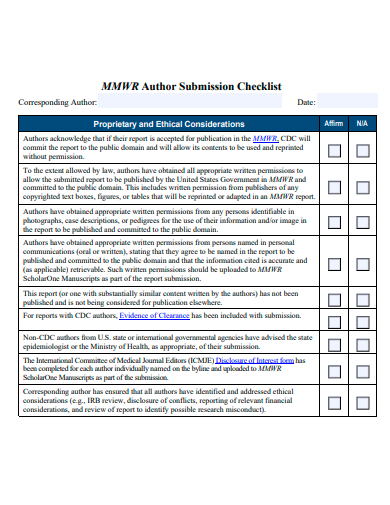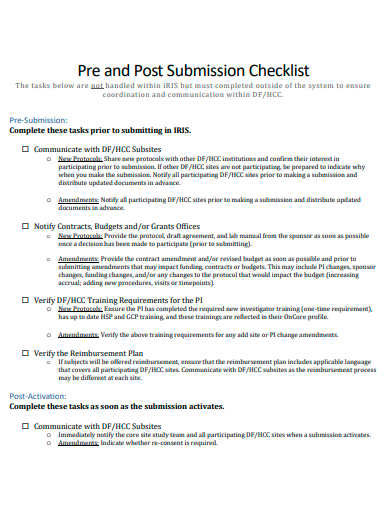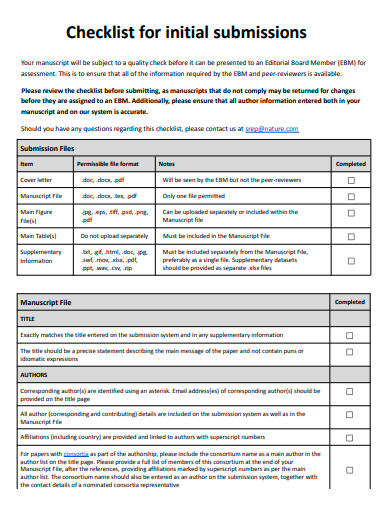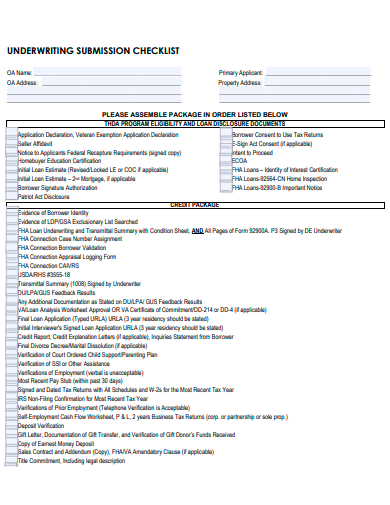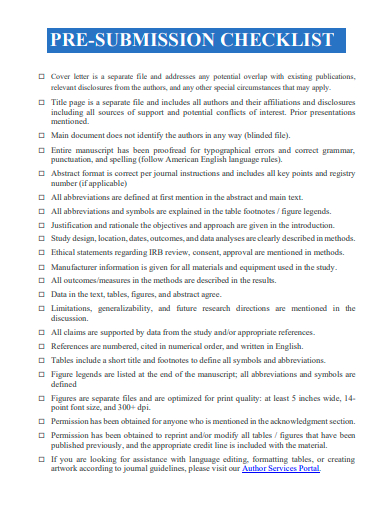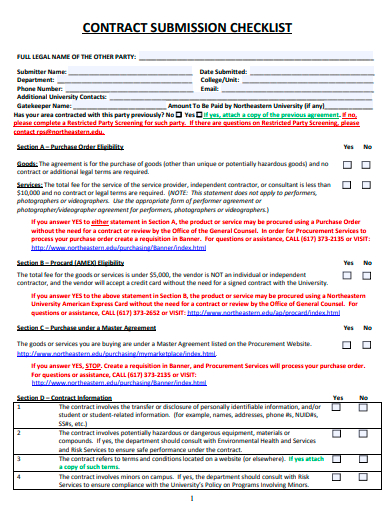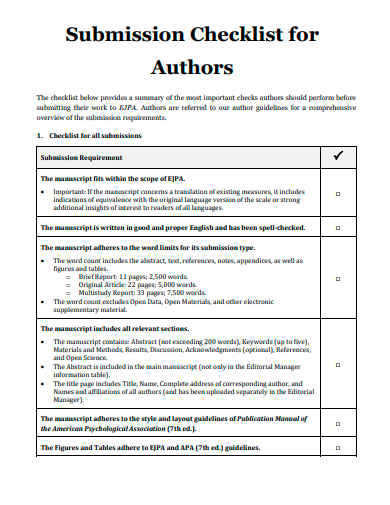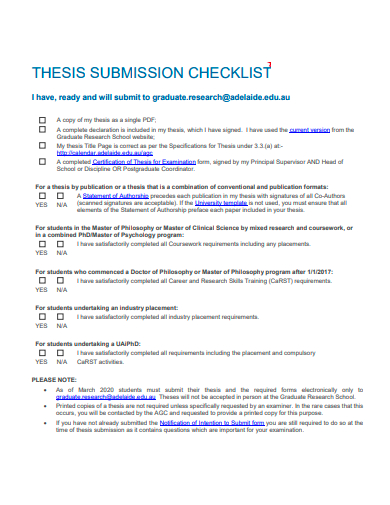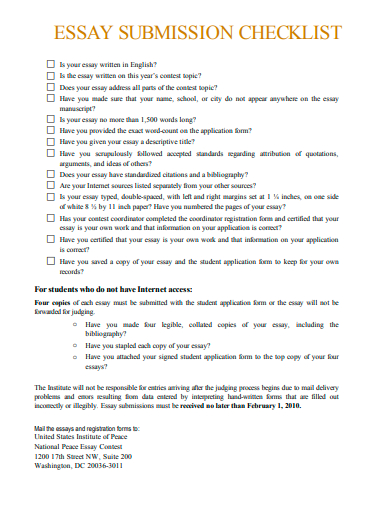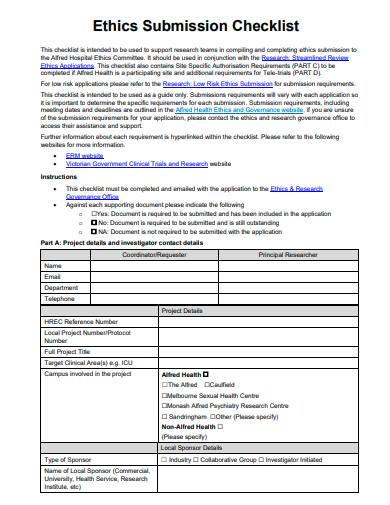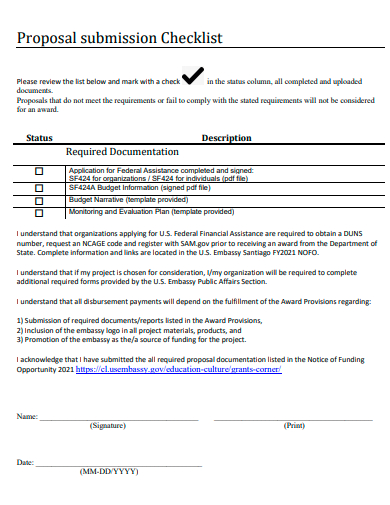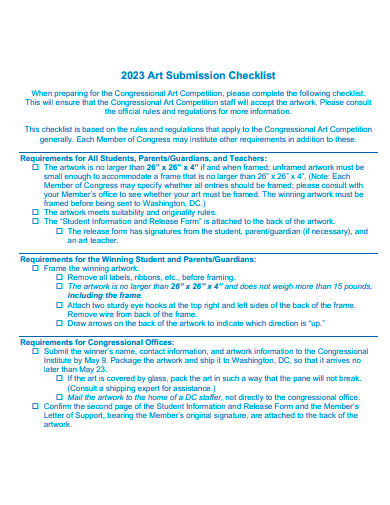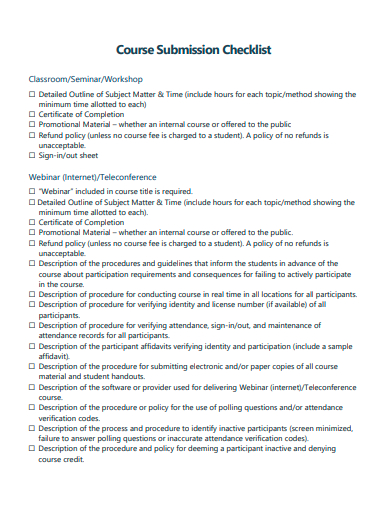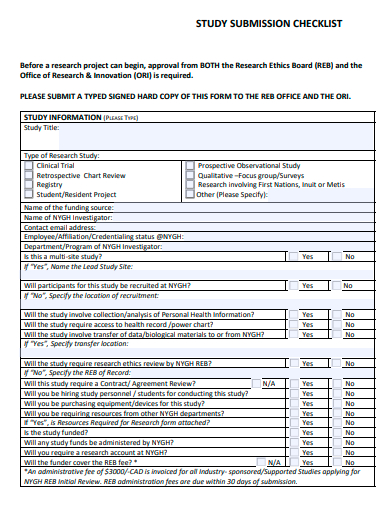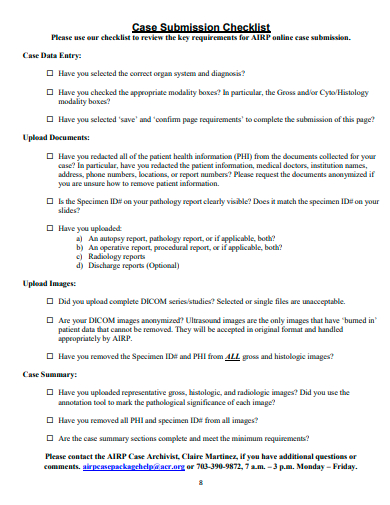Before finalizing any project or document, it’s crucial to have a comprehensive ‘Submission Checklist’ at your disposal. Ensuring every detail has been addressed, this checklist is an invaluable tool for professionals and students alike. Whether you’re submitting a manuscript, a research paper, or a business proposal, adhering to a standardized checklist can greatly enhance the quality and accuracy of your work. Dive in to discover key items you shouldn’t overlook.
18+ Submission Checklist Samples
1. Sample Checklist Template
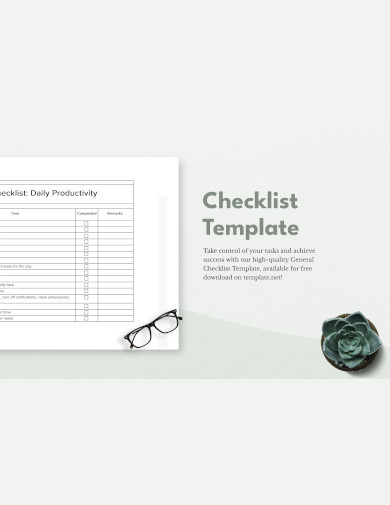
2. Basic Checklist Template
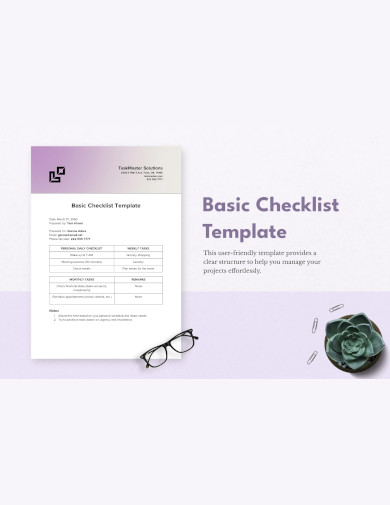
3. Formal Checklist Template
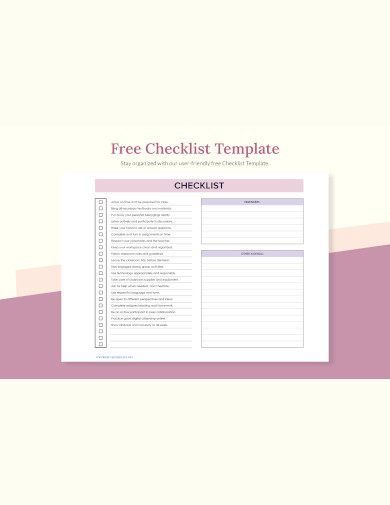
4. Printable Checklist Template
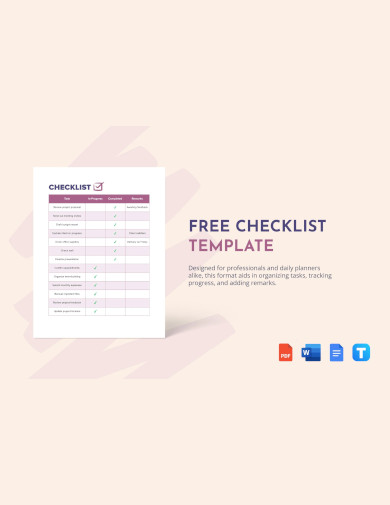
5. Sample Author Submission Checklist Template
What is an Submission Checklist?
Understanding the Submission Checklist
A submission checklist is an organized tool that enumerates all the necessary components required for submitting a particular project, document, or format application. Often used in academic, professional, and bureaucratic settings, this checklist ensures that individuals or teams provide all essential information and adhere to set guidelines before forwarding their work. Essentially, it acts as a final review mechanism to confirm that nothing vital has been overlooked.
The Importance of a Submission Checklist
The primary purpose of such checklists is to maintain quality and consistency in submissions. Whether it’s for a manuscript being sent to a publisher, a grant application, a college assignment, or any other document that requires adherence to specific criteria, the checklist ensures compliance with the required standards.
For instance, in academic publishing, a manuscript might be returned without review if it does not adhere to specific submission guidelines. A checklist can act as a safety net, preventing such oversights that could delay or hinder the acceptance of vital work.
Components of a Submission Checklist
- Document Specifications: This includes ensuring the document is in the correct format, adheres to the specified length, and follows other structural guidelines.
- Content Verification: This ensures all essential content pieces are included, like an abstract for research sample papers, relevant citations, or any other required sections.
- Document Details: Double-checking items like title, author details, affiliations, sample acknowledgments, and more.
- Supporting Documents: Some submissions require supplementary documents, like permissions for copyrighted material, disclosures, or any other relevant supporting information.
- Final Review: A general overview to ensure coherence, grammar accuracy, and that all guidelines have been strictly followed.
Implementing a Submission Checklist
To utilize a submission checklist effectively:
- Early Adoption: Begin with the checklist at the onset of your project. It can guide your process and keep you aligned with requirements from the start.
- Regular Consultation: As you progress, regularly consult the sample checklist to ensure you’re on track.
- Final Check: Before submission, go through each item diligently. This helps catch any last-minute omissions or errors.
Types of Submission Checklist
Submission checklists can be found across various domains, each tailored to the specific needs and requirements of that field. Here are some of the most common types:
- Academic Publishing Checklist:
- Manuscript Submission: Ensures research papers, writing articles, and reviews meet the journal’s guidelines regarding structure, length, formatting, and references.
- Thesis/Dissertation Submission: A checklist for graduate students to ensure that their thesis or dissertation meets the institution’s criteria.
- Grant and Funding Application Checklist:
Ensures that all necessary components for funding requests, such as project descriptions, sample budgets, timelines, and supporting documents, are included. - Job Application Checklist:
Assists job seekers in ensuring their application materials, like sample resumes, cover letters, and references, are complete and tailored to the specific job posting. - Legal and Regulatory Submission Checklist:
Used in legal settings to ensure all necessary documents, evidence, and sample forms are properly filed, be it for court cases, patents, or other legal procedures. - Product or Software Release Checklist:
In the tech world, before a product or software is launched, a checklist ensures all features are working, all bugs addressed, and all documentation is in place. - Real Estate Checklist:
Ensures all documentation like property titles, disclosure forms, inspection reports, and more are in place for property sales or purchases. - Event Planning Checklist:
For organizers ensuring all permits, reservations, and logistical requirements are met before an sample event. - Travel and Visa Application Checklist:
Helps travelers ensure they’ve all the necessary paperwork, tickets, reservations, and other travel essentials. For visa applications, this checklist ensures all required documents, photos, and forms are in place. - Medical and Clinical Trial Checklist:
For healthcare professionals submitting research findings or applying for clinical trials, ensuring all patient data, research methods, and results are correctly documented. - Business and Financial Reporting Checklist:
Ensures that all necessary financial statements, disclosures, and supporting documents are ready for regulatory submissions or shareholder meetings.
What is Checklist for Journal Submission?
Submitting a manuscript to a scholarly journal requires attention to detail and adherence to specific guidelines. A comprehensive checklist ensures that authors fulfill all necessary requirements, increasing the likelihood of a smooth review process and eventual acceptance. Here’s a typical checklist for journal submission:
1. Manuscript Preparation:
- Format and Length: Ensure the manuscript is formatted according to the journal’s specific guidelines. This includes the correct file type, font, spacing, and adherence to word or page limits.
- Title: A concise and descriptive title that effectively communicates the main theme of the manuscript.
- Abstract: A brief professional summary of the study, usually including objectives, methodology, results, and conclusions.
- Keywords: List of relevant terms that will aid in the paper’s discoverability.
- Main Body: Typically consists of Introduction, Methods, Results, Discussion, and Conclusion sections, though the exact structure can vary by journal.
- References: A complete sample list of citations, formatted as per the journal’s citation style (e.g., APA, MLA, Chicago).
2. Figures and Tables:
- Ensure all figures, diagrams, and tables are clearly labeled and captioned.
- Check resolution and format of figures, especially if there are specific requirements.
3. Supporting Documents:
- Cover Letter: A sample letter to the editor explaining the significance of the manuscript, its uniqueness, and why it’s suitable for the journal.
- Conflict of Interest Statement: Declaration of any potential conflicts of interest.
- Data Availability Statement: Information about the accessibility of research data, especially if the journal mandates open data.
- Ethical Approvals: For studies involving human or animal subjects, proof of ethical approval from relevant authorities.
4. Author Details:
- Author Affiliations: Complete details of all authors, including affiliations, email addresses, and ORCID iD (if available).
- Acknowledgments: Recognizing individuals or entities that contributed to the study but are not listed as authors.
5. Additional Files (if required by the journal):
- Supplementary Material: Additional datasets, figures, or tables that support the manuscript but are not critical to its main content.
- Permissions: If you’re reusing content from another source, ensure you have the necessary permissions and they are included with the submission.
6. Final Review:
- Proofreading: Check for grammatical errors, typos, and ensure clarity and coherence.
- Formatting Review: Re-check that the entire manuscript adheres to the journal’s specific formatting guidelines.
- Consistency: Ensure consistency in naming conventions, abbreviations, and terms throughout the manuscript.
6. Sample Pre and Post Submission Checklist Template
7. Sample Initial Submission Checklist Template
8. Sample Underwriting Submission Checklist Template
9. Sample Pre-Submission Checklist Template
10. Sample Contract Submission Checklist Template
11. Sample Submission Checklist for Authors Template
12. Sample Thesis Submission Checklist Template
13. Sample Essay Submission Checklist Template
14. Sample Ethics Submission Checklist Template
15. Sample Proposal Submission Checklist Template
16. Sample Art Submission Checklist Template
17. Sample Course Submission Checklist Template
18. Sample Study Submission Checklist Template
19. Sample Case Submission Checklist Template
How do you Create a Journal Checklist?
Maintaining a journal can be a deeply enriching practice, offering insights into your personal growth, memories, and day-to-day experiences. However, to ensure that you’re making the most of your journaling journey, a checklist can be invaluable. You can also see more templates like Task Checklist Samples. Here’s a guide to creating your journal checklist to optimize your reflective sessions.
Step 1: Determine Your Journaling Goals
Start by asking yourself why you want to keep a journal. Is it to record memories, track personal growth, improve mental well-being, or maybe jot down ideas and inspirations? Understanding your motivations will help tailor your checklist to serve your unique needs. For example, if you’re journaling for mental health, your checklist may focus on mood tracking, gratitude reflections, or stress triggers.
Step 2: Select Your Journal Medium
In this digital age, you can opt for electronic journals using apps or software, or you might prefer the tactile sensation of writing in a traditional paper notebook. Your choice will influence the items on your checklist. For instance, if you’re using a digital journal, reminders to back up entries or explore app-specific features might be crucial. Conversely, for a paper sample journal, your checklist might include selecting a comfortable writing tool or organizing physical clippings and photos.
Step 3: Structure Your Entries
Decide on a general structure for your journal entries. While every entry doesn’t need to follow an exact template, having a consistent structure can help ensure you’re touching on all the elements you deem essential. Your checklist could include prompts such as:
- Date and time
- Current mood or emotion
- Highlight of the day
- Challenges faced and lessons learned
- Personal reflections or musings
Step 4: Add Inspirational Prompts
To keep your journaling experience fresh and stimulating, incorporate a sample list of prompts that can inspire deeper introspection. Depending on your goals, these can range from simple (“What made you smile today?”) to profound (“Write about a time you faced your fears.”). Your checklist should include a reminder to refer to these prompts, especially on days when you feel stuck or uninspired.
Step 5: Set Aside Regular Journaling Time
Consistency is key in journaling. On your checklist, earmark a specific time of day dedicated to your journaling practice. Whether it’s first thing in the morning, during a lunch break, or before bedtime, setting aside dedicated time ensures that journaling becomes an integral part of your routine. Additionally, remind yourself to review past entries periodically; this retrospective look can offer valuable insights into personal growth and changing perspectives.
In Conclusion, A submission checklist serves as a guiding light, illuminating any discrepancies or omissions that could potentially derail the acceptance of a project or document. By ensuring comprehensive adherence to required standards, such checklists not only save time but also enhance the credibility of the work being submitted. You can also see more templates like Thesis Checklist Samples.
Related Posts
FREE 18+ Complaint Checklist Samples in MS Word | Google Sheets | PDF
FREE 18+ Internship Checklist Samples in MS Word | Google Docs | PDF
FREE 18+ Statement Checklist Samples in MS Word | Google Sheets | PDF
FREE 20+ Voluntary Checklist Samples in MS Word | Google Sheets | PDF
FREE 18+ Summary Checklist Samples in MS Word | Google Sheets | PDF
FREE 14+ Sponsorship Checklist Samples in MS Word | MS Excel | PDF
FREE 18+ Conference Checklist Samples in MS Word | Google Sheets | PDF
FREE 17+ Lesson Checklist Samples in MS Word | Google Sheets | PDF
FREE 18+ Progress Checklist Samples in MS Word | Google Docs | PDF
FREE 18+ Enrollment Checklist Samples in MS Word | Google Docs | PDF
FREE 18+ Graduation Checklist Samples in MS Word | Google Sheets | PDF
FREE 15+ Consent Checklist Samples in MS Word | Google Sheets | PDF
FREE 18+ Review Checklist Samples in MS Word | Apple Pages | PDF
FREE 18+ Request Checklist Samples in MS Word | MS Excel | PDF
FREE 21+ Faculty Checklist Samples in MS Word | Google Sheets | PDF

